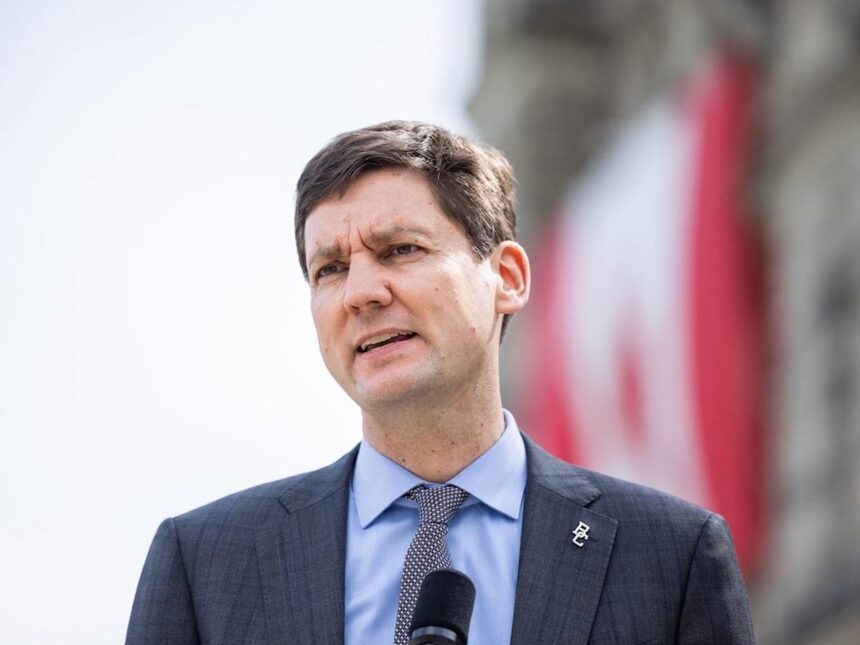When I’m scanning the horizon for economic storm clouds, I typically expect them to form south of the border. Yet for British Columbia, the gathering tempest might be entirely homegrown, brewing within the province’s ambitious climate policies rather than Donald Trump’s protectionist agenda.
The CleanBC initiative, Premier David Eby’s crown jewel of climate policy, has quietly become a significant economic drag on British Columbia’s economy—potentially outpacing even the projected impact of Trump’s threatened tariffs. This revelation isn’t coming from climate skeptics but from the government’s own economic analysis.
A recently uncovered economic impact assessment from the B.C. government estimates CleanBC will reduce the province’s GDP by approximately 2.4% by 2030—equivalent to roughly $9 billion annually in today’s dollars. For perspective, that exceeds the projected 1.7% GDP hit that Trump’s proposed across-the-board tariffs would inflict on Canada’s entire economy.
“What we’re seeing is a situation where well-intentioned climate policies are creating a substantial economic headwind at precisely the wrong moment,” says Jock Finlayson, senior policy advisor at the Business Council of British Columbia. “The cumulative costs aren’t being effectively communicated to British Columbians.”
The CleanBC initiative encompasses a range of policies designed to reduce greenhouse gas emissions, including the carbon tax (now at $65/tonne), the low-carbon fuel standard, and various electrification mandates. While individually defensible, their combined economic weight has become increasingly difficult for businesses to shoulder.
Take the forest products sector, traditionally B.C.’s economic backbone. Mills throughout the province are facing closure, with companies citing CleanBC compliance costs as a significant factor. West Fraser Timber recently announced the permanent closure of its Fraser Lake sawmill, eliminating 175 jobs in a community of just 1,000 people.
“The carbon tax alone adds approximately $6.50 per cubic meter to our production costs,” explains Susan Yurkovich, former president of the BC Council of Forest Industries. “When you’re competing against producers in jurisdictions without comparable climate policies, that’s a substantial competitive disadvantage.”
The situation isn’t unique to forestry. The province’s nascent LNG industry faces similar challenges. While the Haisla Nation-backed Cedar LNG project recently received approval, other major proposals have been shelved, with companies pointing to the regulatory burden and additional costs imposed by CleanBC.
Crystal Smith, Chief Councillor of the Haisla Nation, voiced frustration over the balancing act: “We want responsible development that addresses climate concerns, but if the economic equation doesn’t work, these projects simply won’t proceed—and Indigenous communities lose vital economic opportunities.”
What makes these economic impacts particularly concerning is that they’re happening despite the province’s carbon tax being ostensibly “revenue neutral” for consumers through tax credits and rebates. The business sector, however, absorbs significant costs that aren’t fully offset.
Meanwhile, economic modeling from the C.D. Howe Institute suggests Trump’s proposed tariffs would reduce Canada’s GDP by approximately 1.7%—certainly a substantial hit, but potentially less severe than what B.C. is imposing on itself through CleanBC.
“The difference is that we can’t control what happens in Washington, but we absolutely can adjust our own policies to balance environmental goals with economic realities,” notes Ken Peacock, Chief Economist at the Business Council of B.C.
The province’s economic challenges aren’t solely attributable to climate policy. Housing affordability, global commodity prices, and the lingering effects of the pandemic all play their part. Yet CleanBC stands out as a self-imposed constraint that’s receiving surprisingly little scrutiny relative to its economic footprint.
The B.C. government defends its approach by pointing to the long-term economic benefits of climate leadership. Environment Minister George Heyman emphasizes that “CleanBC is positioning our province to thrive in the global clean economy while protecting our communities from the mounting costs of climate change.”
There’s validity to this perspective. The costs of inaction on climate change are real and potentially enormous. Extreme weather events have already inflicted billions in damages across British Columbia, from devastating floods in the Fraser Valley to wildfires that have razed entire communities.
Yet timing and implementation matter. The province’s approach—pursuing among the most aggressive climate policies in North America while major trading partners move more cautiously—creates economic disadvantages without proportional environmental gains.
“Climate change requires global solutions,” explains resource economist Mark Jaccard of Simon Fraser University. “When one jurisdiction moves too far ahead of its trading partners, you risk carbon leakage—where emissions-intensive activities simply relocate to regions with less stringent policies.”
This is precisely what appears to be happening in certain sectors of B.C.’s economy. When a sawmill closes in British Columbia only to see production shift to less regulated jurisdictions in the southern United States or Eastern Europe, global emissions may actually increase while B.C. loses jobs.
Perhaps most concerning is the relative lack of transparency around these economic trade-offs. The 2.4% GDP impact figure wasn’t prominently featured in government communications about CleanBC but instead emerged from freedom of information requests filed by policy researchers.
For comparison, when the federal government implemented its carbon pricing system, it published detailed economic impact assessments and established mechanisms to protect emissions-intensive, trade-exposed industries.
A more balanced approach might involve maintaining climate ambitions while adjusting implementation timelines and providing more robust protection for trade-exposed industries. The challenge isn’t whether to address climate change—that imperative remains clear—but how to do so without unnecessarily undermining economic foundations.
As British Columbians navigate these complex trade-offs, the conversation would benefit from greater transparency about both the costs and benefits of climate policies. Without this honest accounting, we risk a scenario where legitimate environmental goals generate unnecessary economic pain—and potentially undermine public support for climate action altogether.
In the final analysis, Trump’s tariffs represent an external threat we can influence but not control. CleanBC’s economic impact, however, remains entirely within our ability to adjust and optimize. The question isn’t whether climate action is necessary—it absolutely is—but whether the current approach strikes the right balance between environmental protection and economic sustainability.
The answer, based on the government’s own numbers, suggests there’s room for improvement.






